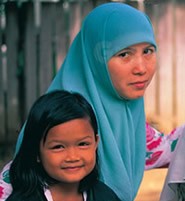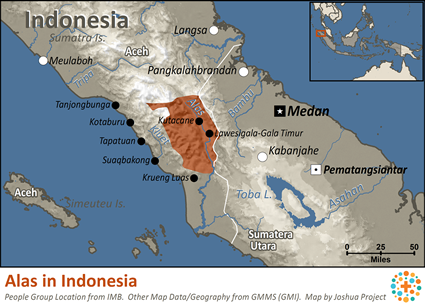The Alas are a people group located in Southeast Aceh Regency, Aceh Province. There are many rivers in the Alas area, including Lawe Alas (Alas River). The area where they live is known as "The Land of Alas". The word alas refers to a mat used for sitting or sleeping. The origins of the Alas remain unknown, although they share many similarities with the Batak ethnic group, such as their language and their family names. Among their folk tales are stories about some Batak idol worshippers from Lake Toba who came to the mountains under their leader, Alas. The long-held traditions and culture of this ethnic group have often been identified with those of the Gayo. During the Dutch colonial era, the government treated these two areas as one district (Land of Gayo and Alas). However, the Alas people are a unique people group with their own culture and language which is actually quite different from the Gayo culture and language. Since 1974, the Alas and Gayo areas have been included in the Southeast Aceh Regency. The Alas are a majority in the districts of Badar, Babussalam, Bambel, Lawe Sigala-gala and Lawe Alas. The standard Alas dialect is the Babussalam dialect. It is also divided into the river-based dialects of upstream or Hulu, central or Tengah and downstream or Hilir.
Most of the Alas people live in villages at high altitudes and make a living from farming and raising livestock. As an agrarian society, the Alas people have a cultural practice called Peleng Akhi, which means “taking turns” or “reciprocating.” Under this tradition, farm work is done cooperatively—either by rotating labor or helping one another. If one man helps a neighbor work his fields, the neighbor is then obliged to return the favor in the future.
The Alas area is considered the "rice storehouse" of the Aceh area. Other agricultural products include rubber, coffee and kemiri (a local spice) as well as forest products such as wood, rattan, resin and incense. Several areas have been disturbed by landslides, erosion and flooding caused by of deforestation. An Alas village is called a kute. A kute usually consists of one or more clans called a marga. Extended families live together in one house and submit to the authority of the parents. They are a patrilineal society, tracing descent through the father's family. The Alas culture emphasizes two kinds of laws. They have both religious laws that are given by God and cannot be changed and traditional laws that are made by community leaders and can be changed according to the times. According to marriage customs, an engagement lasts from one to three years as the groom acquires the bride price and the bride acquires the groom price. When they marry, they live near the groom's parents. After they have children, the young family moves and lives separately (jawe), but they remain in the area of their own clan. Polygamous marriages are permitted only when the marriage has produced only boys, only girls, or no children at all (adak meu keu dueu).
The Alas language and culture differ from those of the Acehnese, but because they share the same Muslim faith, the Alas people have easily assimilated into Aceh's dominant political culture and quickly embraced the implementation of Islamic law. Nevertheless, many Alas still believe in supernatural forces, mysticism, spells, and shamans. They may pray to the spirits for good harvests, invite shamans to chant incantations, or create potions from leaves and flowers, believing these can drive out illness and plague. The art of making these magical potions is passed down only from mother to daughter, never to sons.
The Alas greatly need education and economic development. Southeast Aceh has great potential for tourism, agriculture and mining, but it has not yet been tapped. Foreign and national financial investment to develop this potential would greatly help the progress and well-being of the local people. This area has been affected by floods mixed with mud, sand and gravel. They need resources to handle the threat of erosion, flooding and landslides. This would include education in forest management and reforestation, as well as development of flood prevention methods.
Pray for the Alas people to have the spiritual hunger it takes to seek and find the only savior.
Pray for the Lord to send out loving workers.
Pray for Alas disciples to make more disciples until their families and villages can enjoy his blessings.
Scripture Prayers for the Alas in Indonesia.
Mission Pathway
| Profile Source: Joshua Project |

























